- How does compensation and benefits differ across Europe?
- Base salaries in European tech
- Equity compensation in European tech
- Employee benefits in European tech
- How do pay transparency laws differ across Europe?
- How does the gender pay gap differ across Europe?
- How do employment law and mandatory employee benefits differ across Europe?
The European tech sector has grown significantly in recent years, and now attracts around 20% of total global VC funding (vs less than 5% 20 years ago).
514 unicorns are based in Europe – from Klarna in Sweden to Celonis in Germany to Octopus Energy in the UK and many, many more.
It’s fair to say that the tech scene in Europe is thriving.
This also means that Europe has become home to some of the world’s top tech talent.
And, with many companies now hiring hybrid or remote employees, the potential to scout for talent across Europe has increased in recent years.
So, if you’re hiring talent across Europe, what do you need to know about how employment law and cultural norms on hiring and employment differ across countries?
We’re publishing a series of guides on employment law in different locations, so far we have:
- 🇫🇷 French employment and labour laws: a comprehensive guide
- 🇩🇪 German employment and labour laws: a comprehensive guide
In this article we’ll look at a few key comparisons and differences across countries – and we’ll add additional countries as we publish the employment law guide for them.
Subscribe to our newsletter for a monthly treasure trove of insights from Ravio's compensation dataset and network of Rewards experts, to help you navigate a career in compensation 📩
How does compensation and benefits differ across Europe?
If you’re hiring across multiple locations in Europe, then understanding how compensation differs across those locations is vital to be able to compensate employees competitively for their location across base salary, variable pay, equity compensation, and employee benefits – whilst also ensuring internal pay equity stays intact across the entire team too.
Base salaries in European tech
Let’s look at two example roles using Ravio’s salary benchmarking data for the European tech industry:
- P3 software engineer
- P3 account executive in direct sales.
A P3 is an established IC/professional, as per the Ravio level framework).
For a P3 software engineer, we can see that the UK and Germany are fairly comparable on base salary, whereas in France the typical salary is slightly lower.
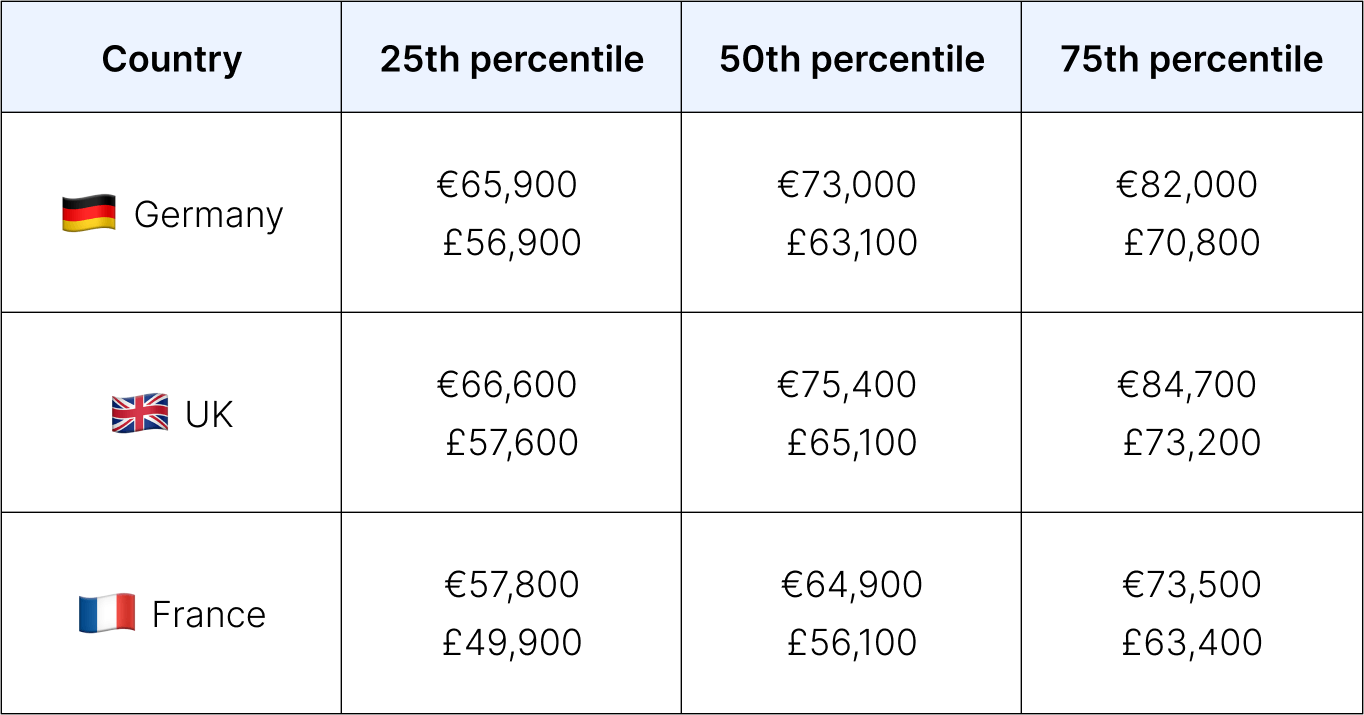
Similarly, for a P3 account executive we can see the same trend – Germany and the UK are roughly the same on base salary, with French employees tending to be paid slightly less.
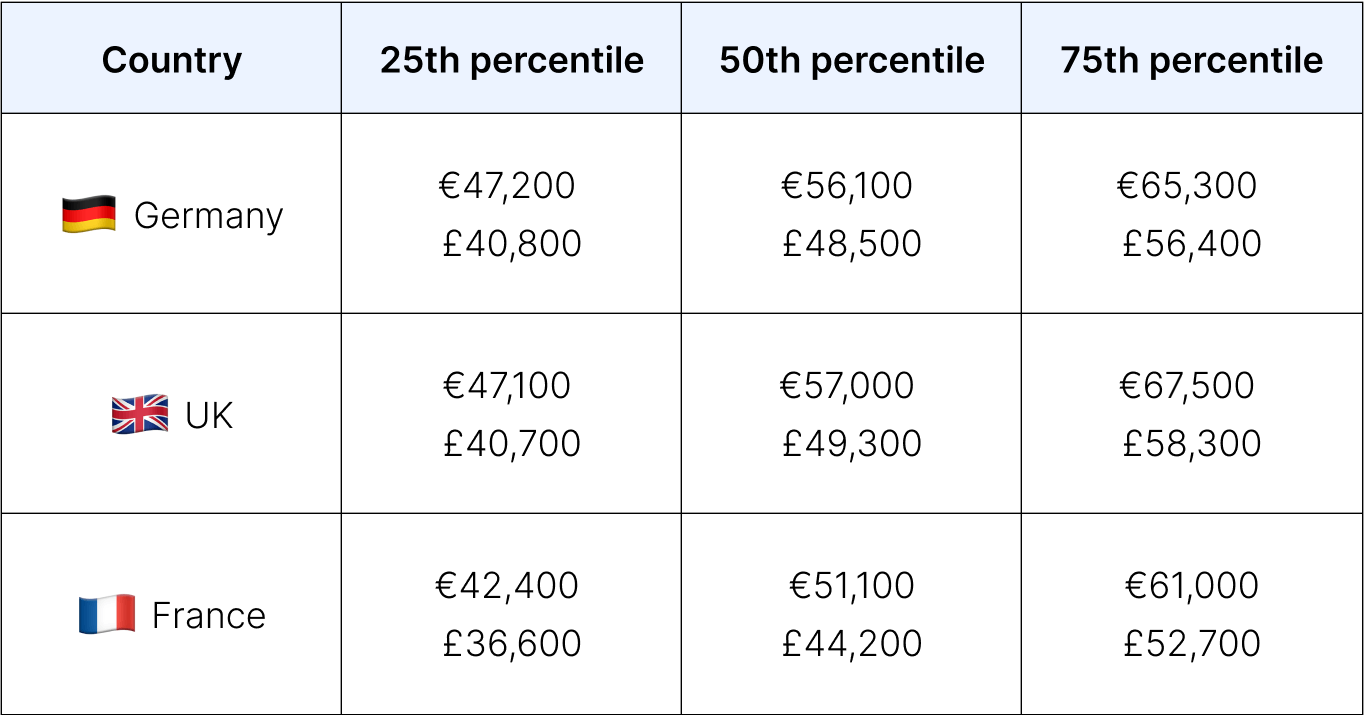
Equity compensation in European tech
There are also differences when it comes to equity compensation.
Looking at Ravio’s equity benchmarking data, we can see that whilst the majority of companies in Europe do choose to grant equity to employees as compensation, there is some variance:
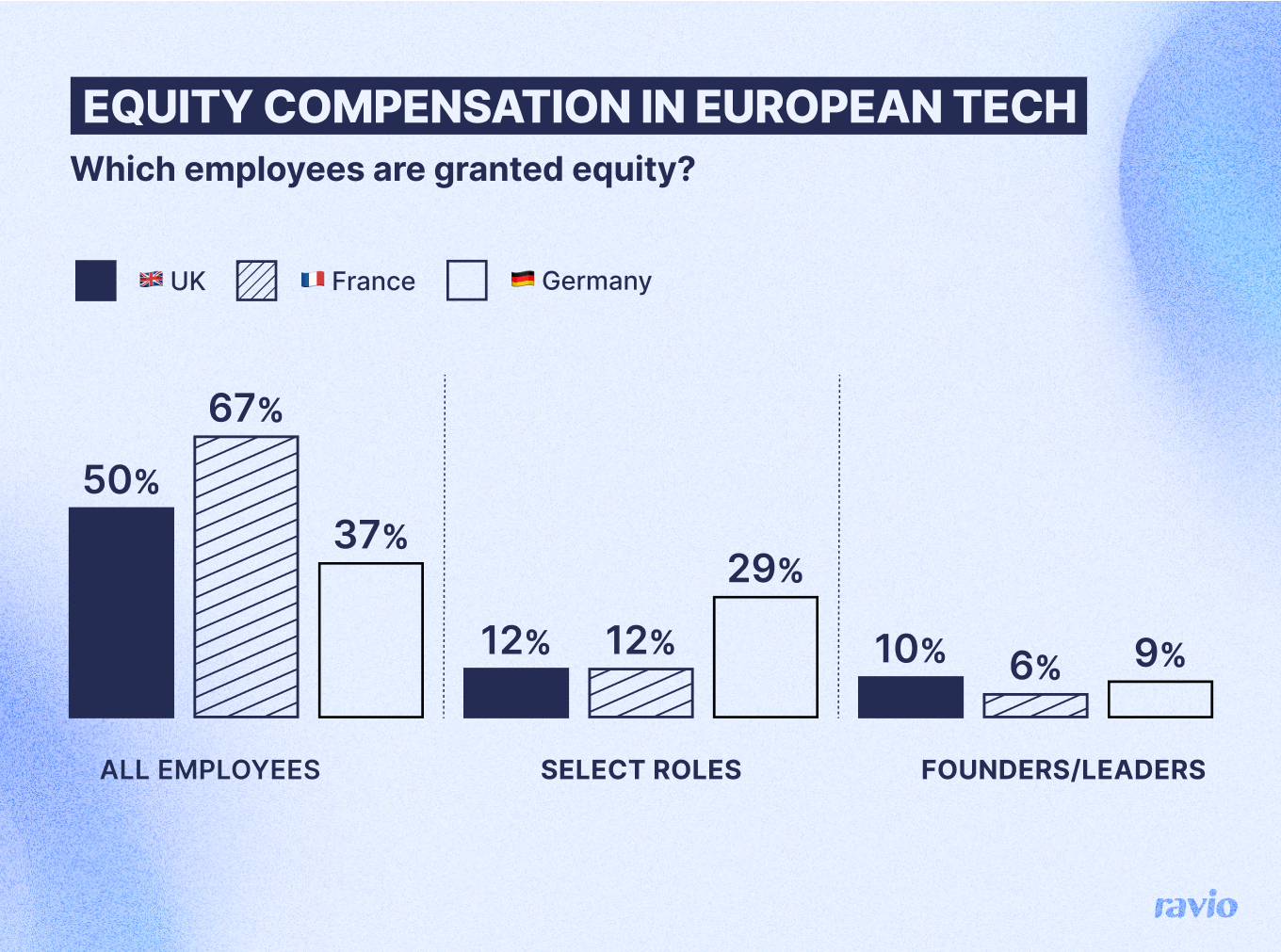
And there’s even more variance when it comes to which employees get equity. We can see that whilst in France 67% of companies offer equity compensation to all employees, in Germany only 37% offer to all employees and it’s much more common for only select roles to be granted equity.
Employee benefits in European tech
Some employee benefits are consistently important across Europe’s tech industry, like flexible working options and paid time off that we’ve already seen.
But, there are also cultural norms which are reflected in employee benefits packages in specific locations.
Here’s a few examples:
- Meal costs. Many companies cover the costs of meals during work hours in some capacity, whether it’s a free office lunch once a week or breakfast provided in the office kitchen. But in France, a government tax-advantaged ‘meal vouchers’ scheme means it’s common for employees to be given a pre-loaded card to pay for meals during work hours, subsidised by the company.
- 13th month salary. In many countries it’s typical for employees to be given an extra month’s worth of salary, often at the end of the year – and this is even mandatory in Belgium.
- Sabbaticals. In Germany it’s very common for employers to offer sabbaticals to employees (often based on tenure e.g. after 5 years at the company), which are often part or fully paid.
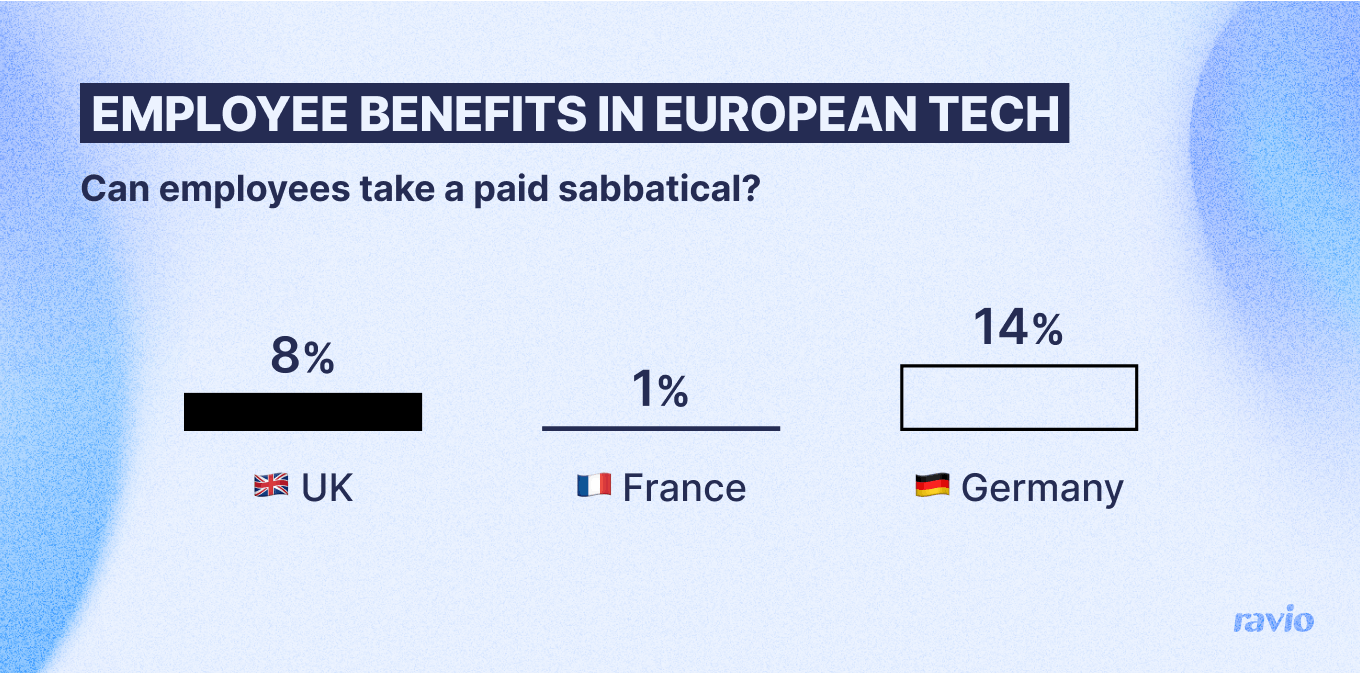
How do pay transparency laws differ across Europe?
Most countries in Europe already have some form of pay transparency legislation.
But, regulations currently vary pretty significantly – which is one of the reasons behind the incoming EU Pay Transparency Directive:
- In France the Gender Equality Index mandates that all companies with 50+ employees must measure and report on five key indicators relating to their gender pay gap, and any company with a score below 75 (out of 100) must take action to improve.
- In Germany the Transparency in Wage Structures Act means that: in all companies with 200+ employees, employees are entitled to discuss salaries and to request information about the salaries of colleagues performing equal work to them; and companies with 500+ employees must report on their gender equality and equal pay initiatives annually.
Often regulations apply both to companies headquartered in the location and companies with a significant amount of employees in that location, so if you have employees across Europe it’s something you definitely need to know.
As the EU Pay Transparency Directive is rolled out across EU member states by 2026, pay transparency legislation will become more consistent – but there will still be variance in how each country chooses to implement the Directive in local laws.
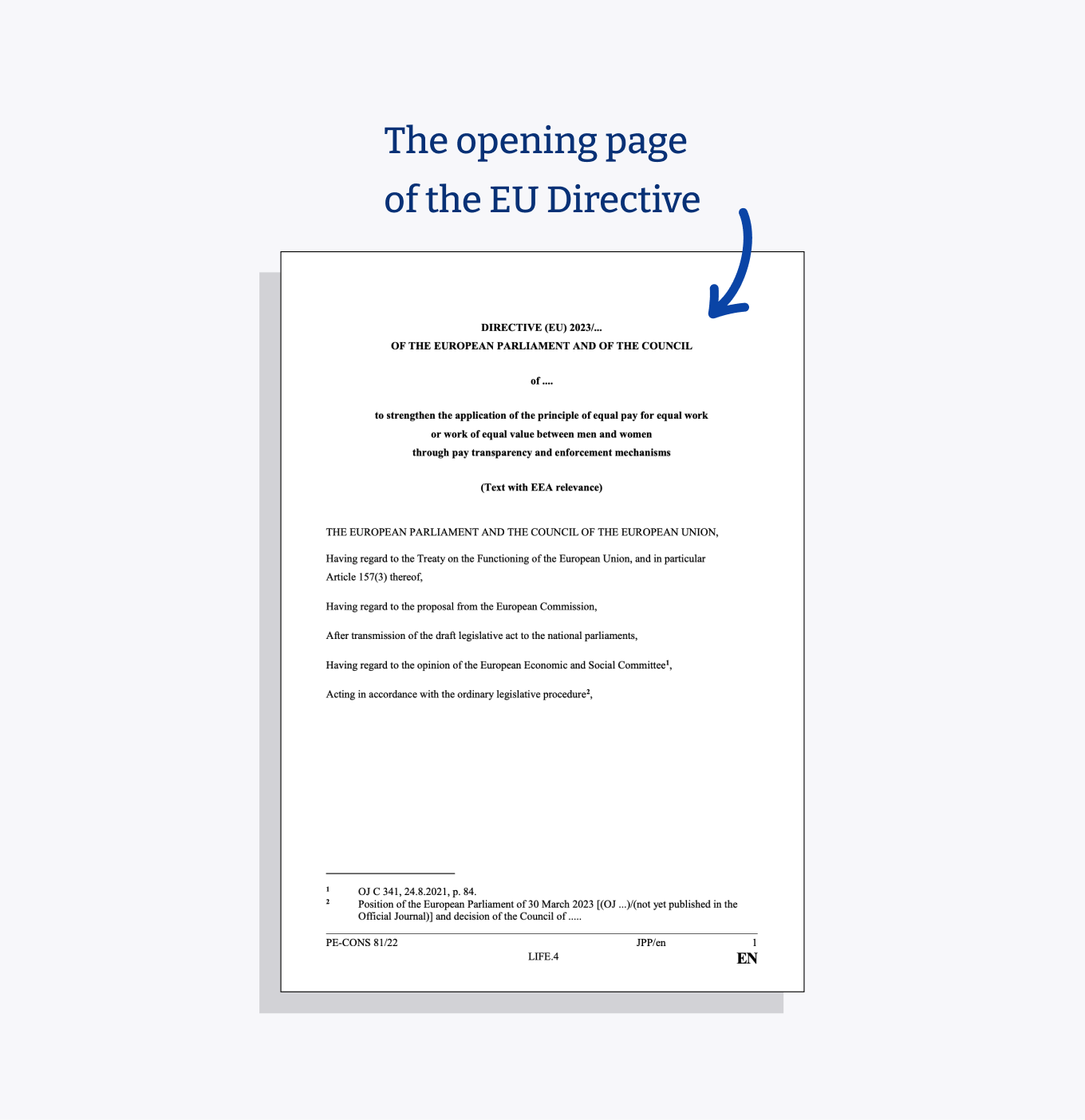
How does the gender pay gap differ across Europe?
Some countries in Europe have made more progress on closing the gender pay gap than others.
For instance we can see from Ravio’s diversity data that France has a gender pay gap of 18% overall (unadjusted, median) which, whilst still significant, is much lower than the Europe-wide median of 25% gender pay gap. Their gender pay gap reporting regulations may (at least partly) explain this, with all companies over 50 employees already having to report on the gender pay gap and take action to address it.
Sweden also has a much lower gender pay gap, which is likely attributable to their government’s focus on policies that promote gender equality.
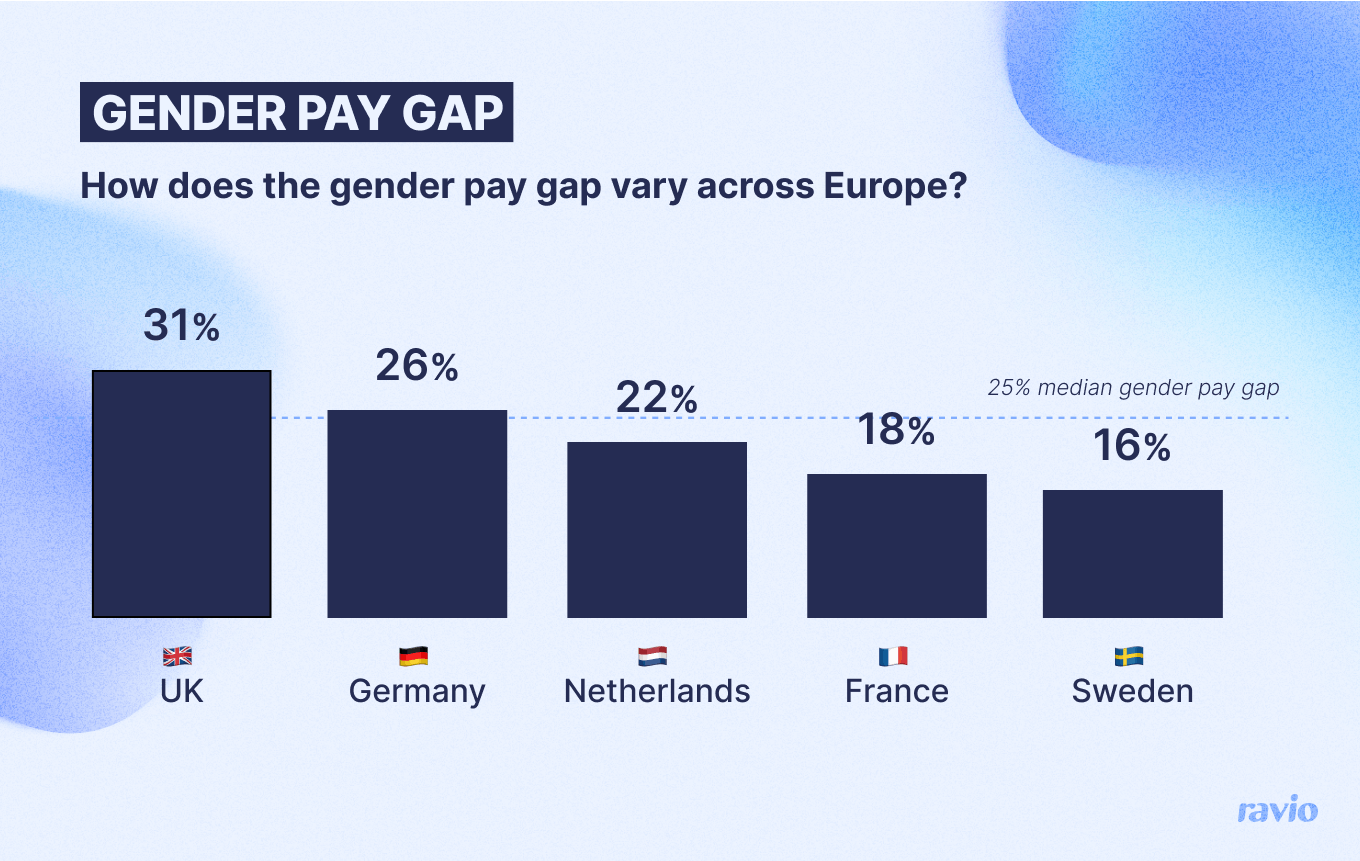
How do employment law and mandatory employee benefits differ across Europe?
Understanding local employment and labour laws is vital if you’re hiring in multiple locations across Europe.
Let’s look at a couple examples of why.
Annual leave entitlements
The statutory minimum on paid holiday days varies across Europe, for instance:
- France: 25 days
- Germany: 20 days for those working a 5 day week, 24 days for 6 day week.
So, if you’re hiring employees from multiple locations across Europe, you may need to change the base holiday day allowance to meet the highest statutory minimum.
Of course, it’s also common for companies to offer above the minimum on holiday days as a benefit to attract top talent.
Looking at Ravio’s data we can see what is actually typical – notably you can see that in Germany the vast majority of employers offer above the statutory minimum for holiday days.
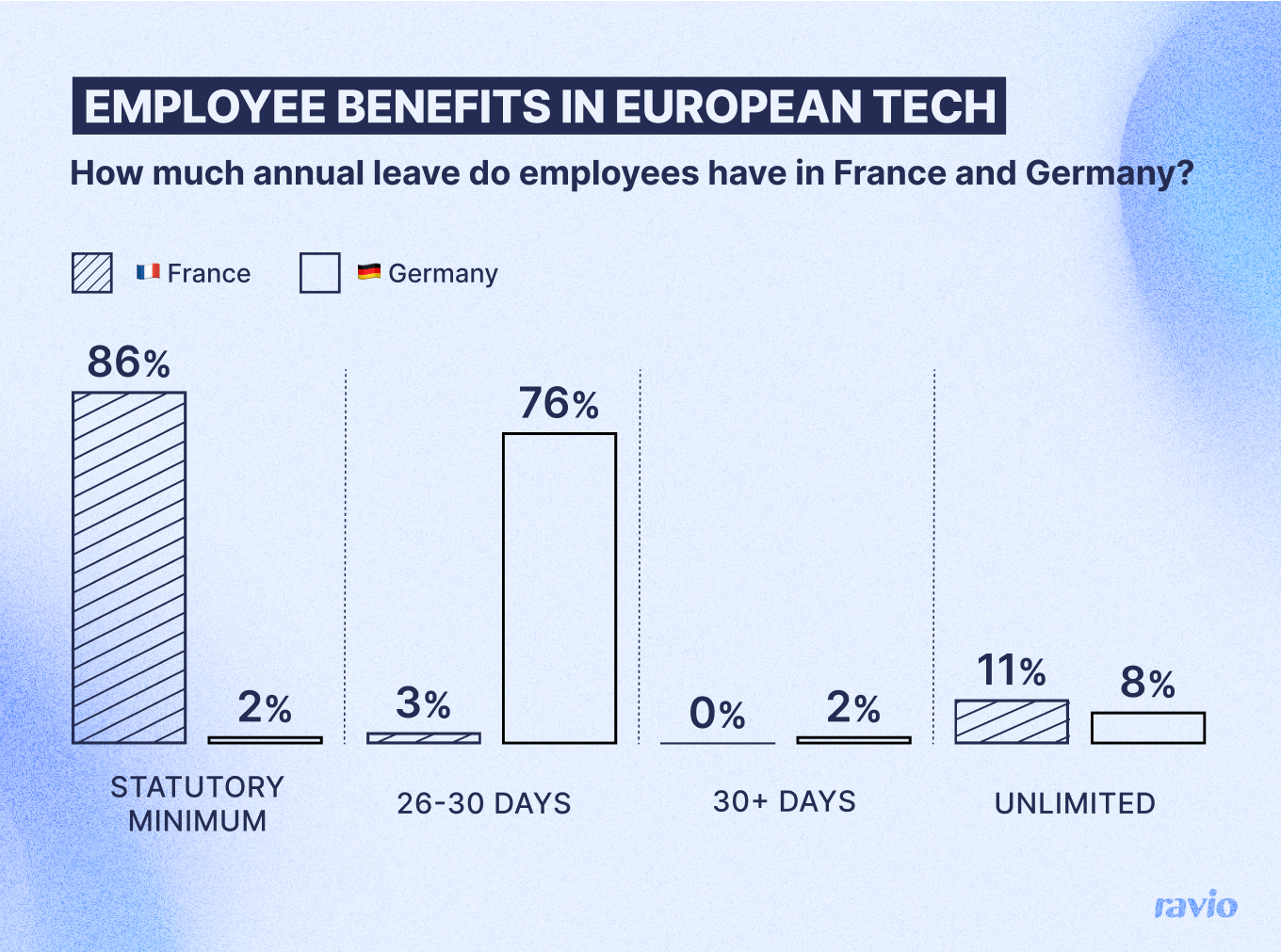
Other paid time off
Alongside annual leave, there are also differences in employees’ entitlement to paid leave from work across Europe – for sick leave, paternal leave, bereavement leave, public holidays and so on – all of which could impact your company policies on time off.
Let’s look at a couple of examples:
- Sick leave. German employees are entitled to six weeks of paid sick leave per year if they’ve been in a role for a month or more. In France, employees are entitled to unlimited paid sick leave if they have been in a role for three months or more (part paid by state, part paid by employer).
- Maternity leave. In Germany it’s possible to take up to 36 months off work to care for a child, with a parental allowance paid by the government. In France, employees that have been in a role for three months are entitled to at least 16 weeks paid maternity leave, and are also entitled to take up to a year off work as parental leave with benefits payments from the state.
- Public holidays. Many public holidays are the same across Europe (like the Christmas or Easter periods), but there are differences. The 14th of July is celebrated as Bastille Day in France. And in Germany International Womens Day is observed in Berlin.
Social security contributions
An employer’s contributions to social security can represent a large cost for the company, so it’s important to understand how this can vary from country to country.
Social security contributions in France and Germany are actually fairly similar, with both employer and employee making payroll contributions to pension, health insurance, unemployment insurance, accidents at work insurance, and insolvency insurance to guarantee wages.
Of course, there are slight differences in terms of the actual contribution amounts – so it’s important to do your research on this if you pay employees across borders.
Working models
In the past few years it has become increasingly common for companies to offer hybrid or remote working models, as flexible working options have become a priority for many job candidates.
So how do Europe’s tech hubs compare on flexible working options?
Hybrid working is now a pretty standard approach across Europe’s tech employers – with France currently taking the top spot with 90% of companies offering hybrid working.
Remote working options are still less common than hybrid, but a substantial number of companies do offer remote working today.
Interestingly, we can see that whereas France has a high proportion of hybrid working, they’re on the lower end of Europe when it comes to remote work.
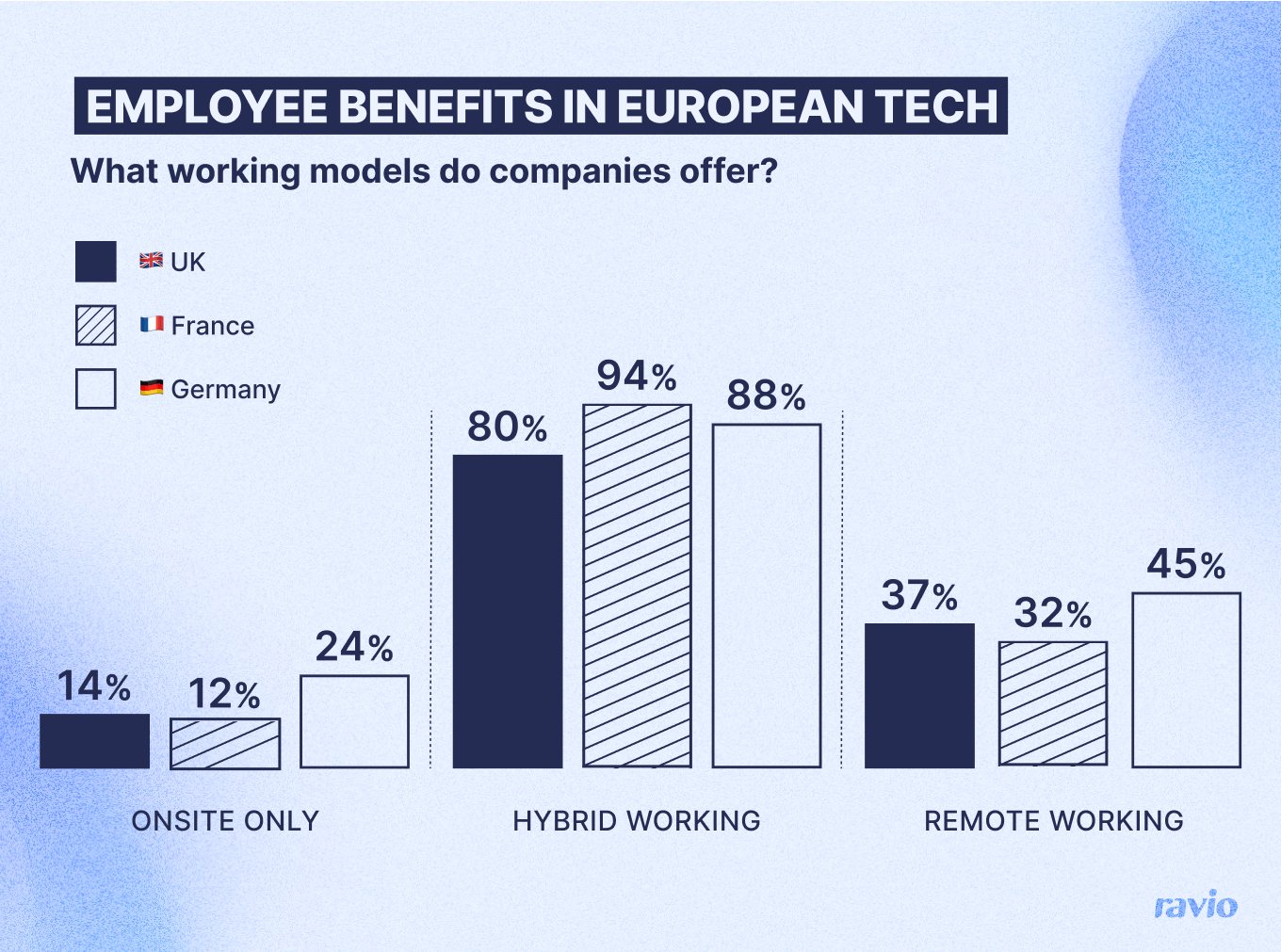
When remote working is offered, it’s can be the case that only some roles are able to be fully remote (for instance engineering roles are more likely to be remote than commercial roles) so there’s typically more variance in how remote working works from company to company.
Remote working is highly desirable for job candidates today, so could be a great way to compete in the talent market. But, you will need to decide on your approach to paying employees across different working locations, if this is the case.
Working hours
Alongside those market differences in terms of ways of working, local employment laws could also impact your policies on working time if you hire across locations.
For instance, in France labour law dictates that the standard working week is 35 hours and that a working day cannot exceed 10 hours. Because of this, it’s very common for French employees to receive overtime pay or reduced working time (réduction du temps de travail or RTT).
In Germany, in contrast, employment law only dictates that working days must be no longer than 8 hours. And in Germany the working week can be Monday to Saturday, so this means the maximum working week is 48 hours according to labour law.
However, collective bargaining agreements are important in Germany, and mean that working hours are often negotiated on an industry basis via trade unions. On top of this, employee worker councils (Betriebsrat) are also commonplace in German companies, with working hours one of the key areas which these councils typically have influence on. Because of these customs, the typical working week in Germany is actually 35-40 hours.
We’ll be regularly updating this article as we continue to publish our series on hiring and employment laws across different locations in Europe – sign up to our monthly newsletter to be kept up-to-date with new releases.
Stay in the loop with our monthly newsletter 📩



